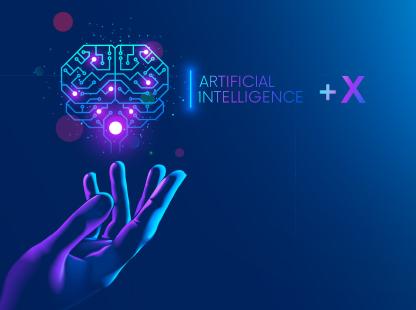
AI + X
AI + X signifies the interdisciplinary application of artificial intelligence (AI) to a diverse array of fields. We are exploring innovative applications of AI, such as machine listening for audio and music analysis (AI + Audio, AI + Music), federated learning for privacy-preserving AI (AI + Cybersecurity), financial market prediction and portfolio management (AI + Finance), solar astronomical data generation (AI + Astronomy) and false claim detection (AI + Journalism), as well as investigating the societal implications of AI (AI + Ethics). By combining AI’s power with domain-specific knowledge, we are advancing both AI and addressing critical challenges across various disciplines. Our cutting-edge work is consistently published at both leading AI and domain-specific venues and its impact is amplified via partnerships with industry for technology transfer, such as NEC, Accenture, Adobe and Qualcomm.
|

Assistant Professor mark.cartwright@njit.edu |
Research Areas: Machine listening, interactive machine learning, human-computer interaction, audio processing, music information retrieval, sound accessibility Machine Listening with Limited Labeled Data Progress in machine listening has historically been hindered by limited amounts of labeled data. This is due to a variety of reasons: we don’t share and tag audio as we do images; licensing terms prevent the distribution of annotated musical audio; and, unlike with images, the average person cannot effectively label audio with just a glance and a click — it takes time to listen. To address this, we have developed and studied methods for self-supervised audio representation learning, few-shot sound event detection, crowdsourced audio annotation and active learning. Interactive Open-World Machine Listening Smart acoustic sensing powered by machine listening has the potential to provide valuable information for numerous tasks, including understanding and improving the health of our cities (e.g., monitoring and mitigating noise pollution) and natural environments (e.g., monitoring and conserving biodiversity). However, contemporary machine listening models can only detect and describe a small fraction of the sounds we care about in the world. To the “ears” of these models, unknown sound classes do not exist or are confused with known classes. This results in a limited view of the acoustic world by sound event detection models that may not align to the goals of end users, hindering the machine listening’s transformative potential. We aim to develop methods and tools to detect, discover, describe and define “unknown” sound events in support of large-scale longitudinal audio analysis and model development. ) |
|

Distinguished Professor gwang@njit.edu |
Research Areas: Deep learning, AI in Finance, AI in Transportation, LLM Financial Market Prediction by Leveraging Generative Adversarial Networks and Graph Neural Networks Financial market prediction faces several key challenges: (1) the stochastic nature of markets requires models to quantify uncertainty, yet most point prediction methods provide limited information; (2) traditional models often overlook market risk; and (3) current models focus on static asset relationships, ignoring the evolving dynamics of financial networks. To address these issues, we first propose RAGIC, a Risk-Aware Generative model for Interval Construction, which focuses on interval prediction by forecasting price ranges that better capture market uncertainty. It also incorporates the volatility index to detect market fluctuations and adaptively adjust interval width in response to risks. In addition, DySTAGE, a novel dynamic graph representation learning framework for asset pricing is introduced. It contains a universal formulation accommodating changing asset composition and connections and a graph learning model capturing both topological and temporal patterns enriched with financial insights, making it highly adaptable to dynamic market conditions. These models offer a more robust and flexible approach to financial forecasting. Portfolio Management by Utilizing Deep Reinforcement Learning and Large Language Models Existing approaches in portfolio management mainly focus on cash-only trading, overlooking potential benefits and risks associated with margin trading, particularly in short sale scenarios. To address it, Margin Trader, an innovative RL framework, integrates margin accounts and constraints into a realistic trading environment, supporting both long and short positions. This framework not only maximizes profits but also manages risks effectively in both bullish and bearish markets, offering traders the flexibility to customize settings in line with market conditions, risk tolerance and personal strategies. Additionally, to dynamically adjust portfolios between long and short positions in response to evolving market conditions, LLMs are incorporated to learn market trends from diverse external data sources, from financial time series to news, enabling a more explainable and transparent decision-making process with a clear reasoning path. By combining RL with the reasoning capabilities of LLMs, this approach significantly enhances market forecasting, strategy optimization and overall performance in portfolio management. |
|

Jason Wang |
Research Areas: Data mining, machine learning, deep learning, explainable AI, generative AI, trustworthy AI, data science Understanding Solar Astronomy with Generative AI Many magnetic field parameters related to solar eruptions, including flares and coronal mass ejections, are derived from vector magnetograms in the Sun’s atmosphere. However, high-resolution high-cadence time series vector magnetograms are lacking in previous solar cycles (except solar cycle 24). In this project, we employ generative AI techniques to create synthetic vector magnetograms in previous solar cycles, which will enable new discoveries in solar astronomy. In addition, these generative AI techniques help (1) enhance spatial and temporal resolutions of observations taken by space-borne and ground-based instruments, (2) clean the observations by removing noises from them and (3) create synthetic EUV images that can provide crucial information of potential radiation hazards such as radio blackouts. The project showcases many important applications of generative AI in astronomy, space physics and solar science. |
|

Brook Wu |
Research Areas: Applications of knowledge representation in fake news detection, knowledge discovery and improving student learning outcomes The ‘Path’ to Clarity: Identifying False Claims Through a Knowledge Graph Exploration Wu’s current research focuses on advancing automated fact-checking by addressing key challenges: claim ambiguity, lack of contextual information, evolving facts and claim complexity. A key theme across this work is the use of Knowledge Paths (KPs) retrieved from knowledge graphs to provide additional context and disambiguate claims. These KPs enhance the representation of both claims and evidence, improving the model’s ability to detect falsehoods. Our work also introduces advanced graph-based neural networks to capture semantic relationships between claims and evidence. Additionally, it addresses the issue of evolving facts, where knowledge changes over time. Our models adapt by incorporating newly available information, improving the robustness of fact-checking systems in dynamic environments. An extension of this work also explores a questiondriven approach that leverages LLMs to systematically disambiguate and decompose complex claims into simpler, verifiable subclaims, resulting in more accurate verification processes. Across these contributions, the research emphasizes efficiency by dynamically retrieving evidence only when necessary, ensuring that external knowledge is incorporated without redundant processes. |
|

Associate Professor wohn@njit.edu |
Research Areas: AI ethics, human-computer interaction Responsible AI This research looks at the ethical and societal implications of using artificial intelligence in social domains that impact our everyday life, such as the detection of hate speech in social media, use of generative AI in creative domains such as art and music and the effect of AI conversational agents on mental health/well-being. We also look at how AI can help and hinder marginalized populations. |